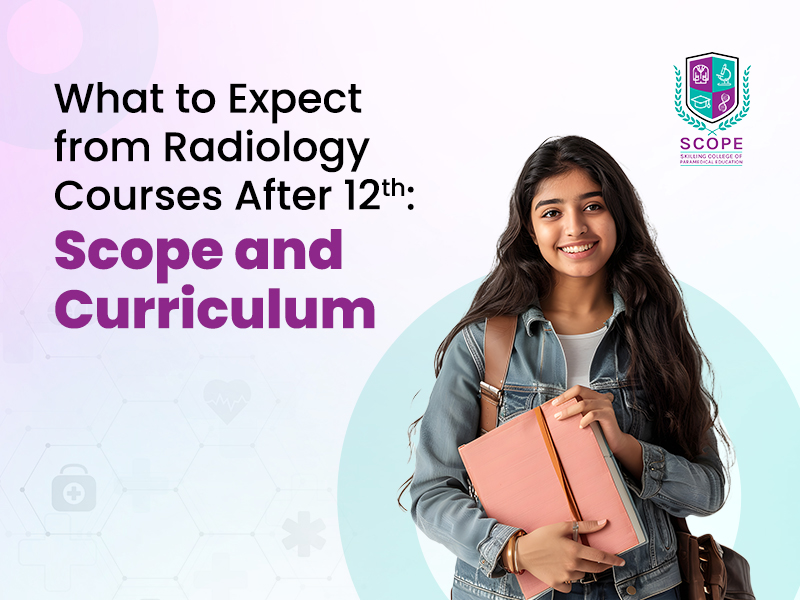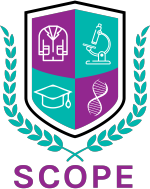
Radiology, a crucial branch of medical science, utilizes imaging technologies to diagnose and treat diseases effectively. After completing the 12th standard, students can pursue specialized radiology courses tailored to prepare them for handling advanced imaging equipment and performing accurate diagnostic procedures. These courses are foundational to modern medical diagnostics and treatment planning.
Why Choose Radiology Courses After 12th?
Choosing a paramedical course can be a strategic decision for those interested in a healthcare career, offering a unique blend of practical skills and theoretical knowledge. These courses are designed to prepare students for essential roles in the healthcare system, where they can make significant contributions without necessarily becoming doctors or nurses. Here are several reasons why one might choose to pursue a paramedical course:
High Demand
The medical field continues to evolve rapidly, incorporating more advanced imaging technologies to improve diagnostics and patient care. As a result, there is a growing demand for skilled radiology technicians who are proficient in using these technologies. This demand ensures steady employment opportunities in various healthcare settings.
Lucrative Salary
Radiology professionals are well-compensated for their specialized skills. Starting salaries are competitive, and there is significant potential for salary growth with experience and further specialization. This makes radiology not only a fulfilling but also a financially rewarding career choice.
Diverse Opportunities
With a qualification in radiology, career paths are not just limited to hospitals. Graduates can find opportunities in diagnostic labs, private clinics, and can even pursue academic or research-oriented careers. This diversity allows for a dynamic career that can adapt to personal interests and changes in the healthcare industry.
List of Radiology Courses after 12th
X-ray Technician
The X-ray Technician course after the 12th is designed to equip students with the fundamental skills and knowledge required to operate X-ray equipment and perform diagnostic radiographic examinations effectively. Students learn about the physics of X-ray technology, which is essential for understanding how images are produced and how to optimize image quality while minimizing exposure to radiation.
Throughout the course, students receive practical training in handling various types of X-ray machines and learn the correct imaging techniques for different parts of the body. This includes training on positioning patients correctly to obtain the best possible diagnostic images while ensuring patient safety and comfort.
The curriculum also emphasizes the importance of adhering to safety protocols to protect both patients and healthcare workers from unnecessary radiation exposure. Additionally, students are taught how to maintain and troubleshoot X-ray equipment to ensure operational efficiency and safety in medical settings.
Duration: The duration of the X-ray Technician course typically ranges from 1 year, depending on the specific program and institution.
Salary: An X-ray technician’s starting salary usually ranges from INR 15,000 to INR 25,000 per month. Salaries can increase with experience, additional training, and specialization in specific imaging techniques.
Career Options: Graduates of this course can pursue careers in various healthcare environments, including hospitals, diagnostic centers, private clinics, and other medical facilities. There is also the opportunity for career advancement through further education and specialization in areas such as computed tomography (CT) or magnetic resonance imaging (MRI).
Certificate in MRI Technician
A Certificate in MRI Technician program after the 12th educates students on the fundamentals of Magnetic Resonance Imaging (MRI), including the physics behind the technology and the operation of MRI machines. This course provides detailed training on how to perform MRI scans, which involve detailed images of organs and tissues, making it essential for diagnosing various medical conditions.
Students learn about patient safety and comfort, critical aspects of MRI procedures, as they involve dealing with patients who may be experiencing severe health issues. The program also covers the maintenance and troubleshooting of MRI equipment, which is crucial for ensuring the smooth operation of this sophisticated technology.
Duration: This certificate program usually lasts for 1 year.
Salary: The average salary for an MRI technician in India can start from INR 20,000 per month and can increase significantly with experience, expertise, and location.
Career Options: MRI technicians can work in hospitals, specialty diagnostic centers, and research facilities. They may also pursue additional qualifications to advance into roles such as MRI supervisory technicians or MRI application specialists.
Certificate in Radiology Technician
The Certificate in Radiology Technician program educates students on various imaging technologies, including X-rays, CT scans, and ultrasounds. This course thoroughly covers the technical aspects of handling and maintaining radiology equipment, ensuring that students can perform diagnostic tests accurately and efficiently. It also delves into the principles of radiation safety, which is critical for protecting patients and healthcare workers.
Students receive training on how to prepare patients for radiological procedures, focusing on communication skills and patient management strategies to ensure comfort and compliance during imaging sessions. The course is designed to be comprehensive, providing practical skills that will be essential in any radiology department.
Duration: The certificate program generally spans one year.
Salary: Initial salaries for radiology technicians can range between INR 12,000 to INR 20,000 per month, with potential increases based on experience and additional certifications.
Career Options: Career opportunities for certified radiology technicians include positions in hospitals, outpatient clinics, diagnostic imaging centers, and emergency medical facilities. They are integral to the diagnostic process and play a crucial role in the healthcare industry.
Bachelor of Vocation in Radiology and Medical Imaging Technology
The Bachelor of Vocation in Radiology and Medical Imaging Technology is an undergraduate program that offers in-depth knowledge and training in the field of radiological technology and medical imaging. This comprehensive course covers advanced imaging techniques such as MRI, CT scans, and ultrasonography, along with the fundamental sciences of physics and anatomy relevant to the field.
The program emphasizes both the theoretical aspects of imaging technology and practical applications, ensuring that students are well-prepared for real-world scenarios. It includes extensive clinical practice to give students hands-on experience in a variety of imaging procedures, making them proficient in diagnosing and managing patient care.
Duration: This bachelor’s program typically lasts for three years.
Salary: Graduates can expect to start with a salary ranging from INR 25,000 to INR 35,000 per month, with the potential for significant growth as they gain experience and specialize further.
Career Options: Graduates of this program have a wide range of career options available, including roles as diagnostic imaging technologists, radiographers, sonographers, and positions in medical imaging research. They can also pursue postgraduate studies or specialized certifications to further enhance their qualifications and career prospects.
Top College for Radiology Courses After 12th
For students aiming to pursue radiology courses after the 12th grade, Skilling College of Paramedical Education is an excellent choice. As a government-affiliated institution, it provides a credible and comprehensive educational pathway in the field of radiology and medical imaging. Known for its rigorous curriculum and state-of-the-art facilities, Skilling College ensures that its graduates are well-prepared to meet the high standards of the healthcare industry.
The college offers a diverse range of programs, including certificates and diplomas in X-ray technology and MRI technology, as well as more advanced degree programs such as the Bachelor of Vocation in Radiology and Medical Imaging Technology. Each course is structured to deliver a blend of theoretical knowledge and practical skills, essential for successful careers in radiology.
Skilling College is dedicated to nurturing skilled professionals equipped to handle the dynamic challenges of the healthcare sector. With a team of experienced faculty and a commitment to practical training, students gain the experience and confidence required to excel in various medical imaging roles.
Conclusion
Pursuing radiology courses after completing the 12th grade offers a promising pathway into the healthcare industry, providing both job security and diverse career opportunities. With competitive salaries and the chance to make a significant impact in patient care, radiology stands out as a fulfilling and dynamic field. As medical technology advances, the demand for skilled radiologists is set to increase, making this an opportune time to enter the field.
Frequently Asked Questions
Do you need NEET for radiology?
A: No, NEET is not typically required for diploma or certificate courses in radiology.
What is the salary for radiology courses after the 12th?
A: The starting salary for radiology technicians right after completing their course can range from INR 15,000 to INR 25,000 per month in India, with potential increases based on experience and further qualifications.
What is the qualification of a radiologist?
A: A radiologist is a medical doctor who specializes in diagnosing and treating diseases and injuries using medical imaging techniques. They typically hold a medical degree followed by specialized training in radiology.
Can we do Radiology without MBBS?
A: Yes, you can pursue a career in radiology without an MBBS degree. There are diploma and bachelor’s degree programs in radiologic technology that do not require a medical degree.
Is radiology a good scope?
A: Yes, radiology has a broad scope with expanding opportunities due to advances in medical imaging technology. The field is essential for diagnostics and treatment planning, ensuring its importance in medical care.
Do radiologists have a high salary?
A: Yes, radiology has a broad scope with expanding opportunities due to advances in medical imaging technology. The field is essential for diagnostics and treatment planning, ensuring its importance in medical care.
Is radiology a good scope?
A: Yes, radiologists, who are medical doctors specializing in imaging, are among the highest-paid professionals in the healthcare sector. Their salaries can be significantly higher than those of non-doctor radiology technicians, reflecting their advanced qualifications and responsibilities.
